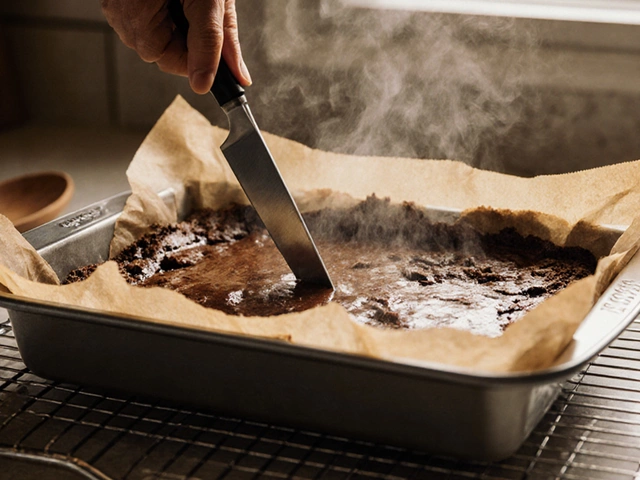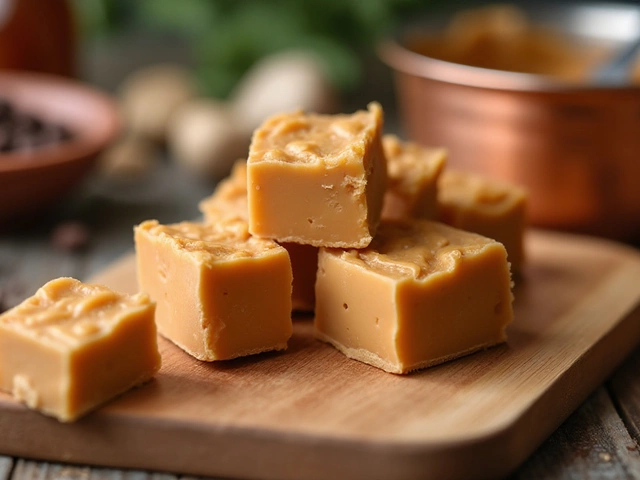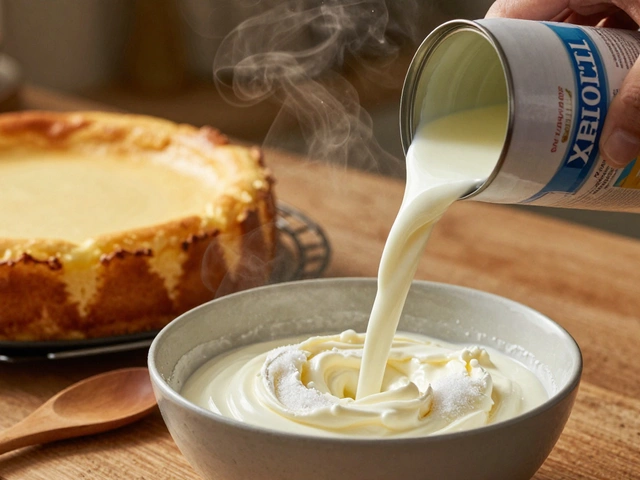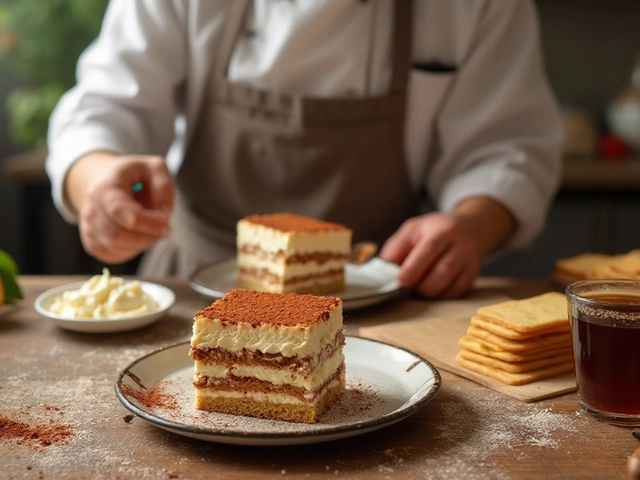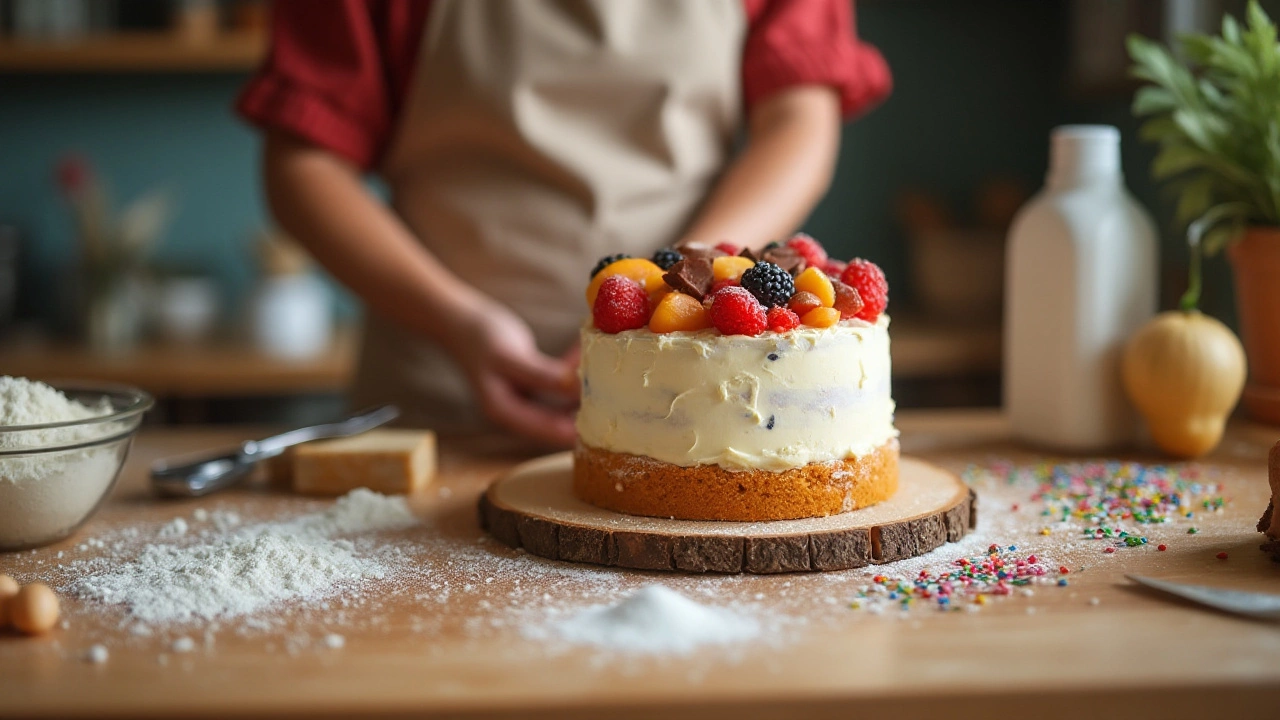
Deciding between buying a birthday cake from a store or baking one at home is a common dilemma, especially when budget is a concern. With flavors, designs, and dietary needs to consider, both options have their unique appeal. Delving into the price differences requires looking beyond the initial cost, examining factors such as ingredient prices, preparation time, and personal skill levels.
Baking at home often has the potential to be more cost-effective, particularly if you already own the basic kitchen tools. However, store-bought cakes offer convenience and professional decoration skills, which can be a time-saver. Special designs and dietary needs can tip the scales, influencing costs significantly. Through understanding these dynamics, you can make a smart choice that aligns with both your celebration spirit and your budget.
- Understanding the Costs
- Ingredients and Tools
- Time and Skill Investment
- Customization and Special Requirements
- Cost-Saving Tips
- Balancing Cost with Convenience
Understanding the Costs
Deciding whether to make a birthday cake or buy one can initially seem simple, but unraveling the true costs involves peeling back several layers. The basic comparison often begins with ingredient prices for homemade cakes versus the price tags of pre-made cakes at local bakeries or supermarkets. Home bakers sometimes find that their grocery list quickly adds up—flour, sugar, baking powder, butter, eggs, and not forgetting essential tools like cake tins and mixing bowls. Surprisingly, these essentials can amount to more than you initially estimate, particularly if you're also purchasing frosting or fondant for decoration.
Shopping at your local store for a birthday cake brings about different considerations. Store-bought cakes usually encapsulate not just ingredients but also labor costs. Behind every figure on a price tag sits the skill of a baker, quality of ingredients, plus the brand’s mark-up to ensure profitability. Store cakes often appear cheaper in upfront costs, especially for basic designs and flavors, which makes them attractive choices for busy individuals. Conversely, opting for bespoke designs or dietary-friendly options, like gluten-free or vegan cakes, generally hikes up the final bill.
Time is another essential element that's sometimes difficult to quantify but plays a significant role in perceived cost. If budgeting money means outlaying hours in the kitchen, it's worth considering your own hourly worth. Baking is a labor of love, but it's important to count your hours when measuring cost-effectiveness. As Claire Saffitz, a celebrated pastry chef, once shared,
"Baking at home is not just about saving money; it's also investing your time in a personal creation that carries meaning."
When we factor in customization, the costs can shift sharply. Whether it's a child’s much-adored character cake or a tiered masterpiece for a milestone birthday, additions like intricate icing details, fondant characters, or edible gold leaf escalate both materials and labor significantly. These special touches, while adding unique value, should be accounted for carefully in your budget assessment. Balancing these considerations helps provide a realistic framework for how costs will stack up, enabling you to make the most informed choice for your celebration needs.
Statistical Insight
It's revealing to look at some figures comparing homemade and store-bought cakes. According to a 2023 survey from a popular baking magazine, nearly 45% of people believe they spend less on cakes when baking them at home. Interestingly, the same survey highlighted that individuals who value time-saving aspects rated their overall savings higher by purchasing cakes. Here's a small comparison table for basic cake prices:
| Option | Price Range |
|---|---|
| Homemade Cake (8-inch) | $15 - $25 |
| Store-Bought Cake (8-inch) | $20 - $35 |
This comparison illustrates how each choice holds its financial implications, echoed by preferences and the context of the celebration. Aligning your needs with these costs becomes vital in creating a celebration that matches your vision without straining your budget.
Ingredients and Tools
Embarking on the journey of baking a birthday cake at home requires a closer look at the ingredients and tools you'll need. Typically, the foundational components of a cake include flour, sugar, eggs, butter, and baking powder. However, the complexity and flavor profile can be expanded with the addition of elements like cocoa powder for chocolate cakes or mashed bananas for a moist banana cake. For those aiming to stick to a budget, buying ingredients in bulk can significantly reduce costs in the long run, especially if baking becomes more than just a one-time affair.
On the equipment front, a few essential tools are necessary to ensure the cake-making process goes smoothly. A mixing bowl, whisk or electric mixer, spatula, and an oven-safe cake pan are must-haves. Investing in these tools might seem like an initial splurge but offers a long-term payout if cake-making morphs into a kitchen hobby. Those with aspirations for more decorative cakes might also consider acquiring piping bags and nozzles for intricate designs. It’s useful to note that online stores often list cake-making kits that bundle these tools, making the process of acquiring them a bit easier and sometimes cheaper than buying individually.
When weighing the cost against a *store-bought cake*, remember that homemade delights allow control over each ingredient. This is a particular plus for those with dietary restrictions or preferences, such as vegan or gluten-free diets. To illustrate, a stat from the International Food Information Council suggests that nearly 70% of consumers appreciate knowing more about the origins and contents of their food, aligning perfectly with homemade options.
One might hear during baking classes or forums, "A cake is only as good as its ingredients," a sentiment echoed by many enthusiasts. Investing in quality vanilla extract, for example, can transform a basic vanilla cake from bland to heavenly. Similarly, using fresh eggs and real butter as opposed to margarine can uplift the texture and flavor of your cake dramatically. Remember, a little investment in better ingredients can make a significant difference in your final product.
Besides the recipe, presentation is key. Investing time in learning how to apply a smooth buttercream coat or arranging fresh fruit for adornment can enhance the homemade cake experience. Should you lack confidence in skills, several online platforms offer free or affordable courses to hone your cake decorating techniques. And while the initial expense might cause a frown, the skill could save you money down the line, as some opt for buying fancy cakes mainly for their looks, not taste.
In essence, equipping your kitchen with the right tools and choosing your ingredients wisely not only bestows creative freedom but also can be a more cost-effective approach in the long term. Embrace the learning curve, enjoy the process, and savor the eventual rewards; both to your taste buds and pocketbook.
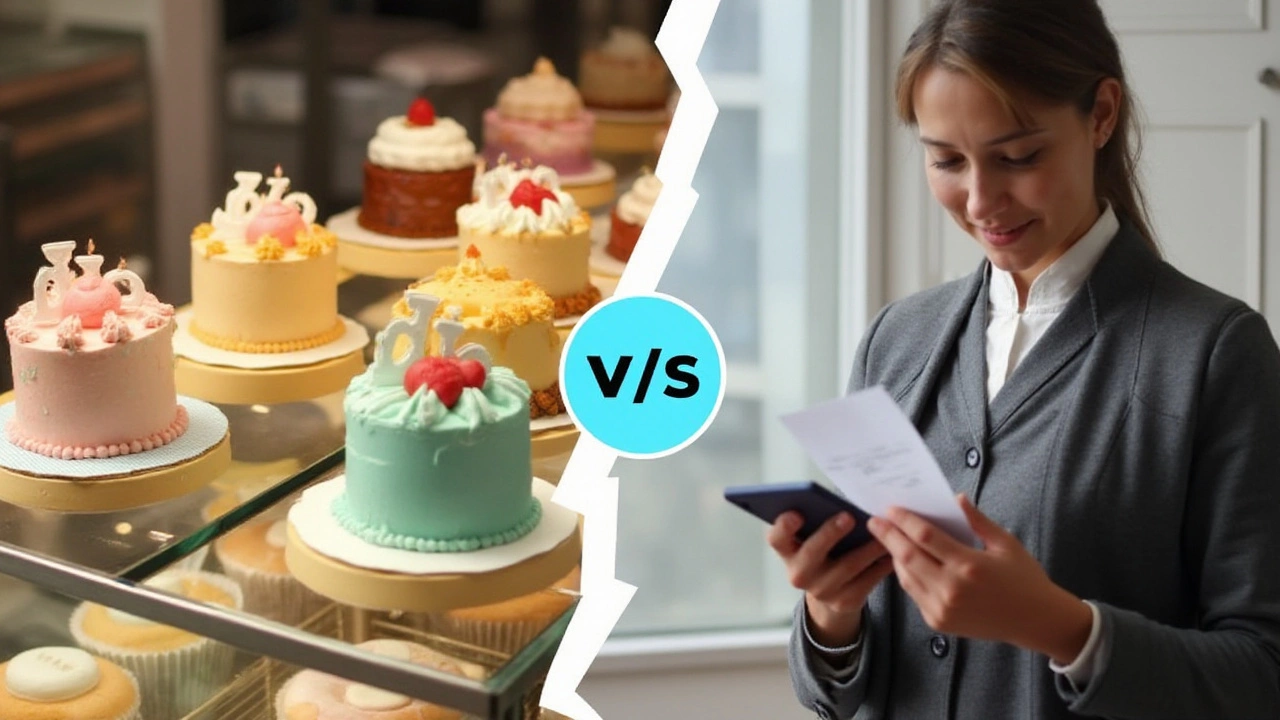
Time and Skill Investment
When pondering over whether to buy or bake a birthday cake, one can't simply overlook the significant roles that time and personal baking skills play in this decision-making process. Baking a cake from scratch requires more than just a love for sweets; it demands planning, precision, and a fair bit of patience. On a practical level, baking isn't just about mixing ingredients. It involves sifting flour, beating eggs until they're fluffy, and folding batter with just the right amount of care. For those who frequently bake, these steps come naturally, but for others, such tasks might feel like navigating uncharted territory.
The time factor is also critical because baking involves stages that can't be rushed. Preparing batter and baking it to perfection, allowing it to cool, and then decorating it—each phase needs dedicated chunks of time. A simple cake can take a few hours, but elaborately decorated or multi-tiered custom designs could extend into days. For individuals with busy schedules, this can be a deterrent. Conversely, purchasing a cake from a local bakery or supermarket can be a swift alternative—merely a matter of browsing through a catalog and placing an order.
Skill level is another essential consideration. Not everyone boasts the same prowess in the kitchen. While some amateur bakers might delight in crafting elaborate fondant creations or attempting intricate piping work, others might find even the thought daunting. It's crucial to understand one's level of *comfort and expertise* with DIY projects. Notably, a study once mentioned by The Washington Post suggests that it takes, on average, ten attempts to master a particular cake recipe, emphasizing the importance of practice and patience.
Adding to the complexity, baking at home allows for customization, which is a lure for many. This flexibility lets you cater to specific dietary requirements and indulge in preferred ingredients. However, achieving top-notch results demands a practiced hand in baking techniques and decorating skills. On the flip side, hiring a professional baker to craft a custom cake can alleviate this burden, albeit at a cost. Therefore, weighing the demands of time and skill against potential savings and personal satisfaction is essential when deciding whether to opt for a store-bought cake or venture into the baking realm yourself.
For those inclined to attempt a homemade cake, it's beneficial to attain a few essential tools, such as an electric mixer, piping bags, and a revolving cake stand—each playing its part in a seamless baking experience. Moreover, numerous online resources and workshops are available for budding bakers eager to harness their skills. Through insight and experimentation, one can gradually achieve the blend of artistry and taste, making each birthday cake not just a dessert but a cherished memory.
Customization and Special Requirements
When it comes to birthday cakes, customization is where both store-bought and homemade options can either shine or become a costly endeavor. Whether you have a specific theme in mind, special dietary needs, or just want an extraordinary design, these factors can significantly influence the price.
Firstly, for those looking for a unique design, store-bought cakes often offer the expertise of experienced bakers who can create intricate designs and decorations. This gives you the option to collaborate with skilled decorators who know how to combine colors, textures, and techniques to bring your vision to life. Fancy wedding-style sugar flowers, elaborate fondant sculptures, or even edible photo prints can be requested at professional bakeries. However, these designs come at a premium cost. Sources have shown that customized cakes typically start at higher base prices and increase with the complexity of design and detail.
On the other hand, baking at home allows for creative freedom but requires a substantial investment of time and effort, particularly if you're aiming for a fancy theme or design. Many amateur bakers enjoy the challenge of DIY designs. The digital age provides access to countless tutorials and cake decorating forums where you can learn how to mold fondant, pipe buttercream, or even make your own cake toppers. However, acquiring specialized tools—such as piping tips, food coloring, and molds—which may not be a one-time cost if you’re planning just one cake, can add up quickly.
Dietary restrictions are another major consideration. Whether its gluten-free, vegan, or allergen-sensitive ingredients, special dietary requirements can impact the choice between a homemade and a store-bought cake. Some bakeries specialize in these alternatives, often with great success, but the niche capabilities can reflect in their charges. While baking at home offers control over ingredients, ensuring the flavor and consistency are up to par can be a challenge requiring trial runs, which can also mean time and money. Relying on professional bakers might alleviate that concern, but often comes at a premium rate due to the specialized ingredients.
"Custom cakes are not just about beautiful designs; it's about tailoring a dessert that considers every unique requirement without compromise," explains Emily Smith, a renowned cake designer. "The key lies in balancing the vision with the practicalities of cost and craftsmanship."
While professional customization handles the intricate jobs with finesse, combining it with personal touches can be rewarding. Some people prefer ordering a simple base cake and tackling the decorations themselves. This middle ground allows for personalization without risking expertise for tricky decoration techniques. Finding that sweet spot between creativity, cost-effective choices, and practical skill can make the cake not just a dessert but a centerpiece of cherished memory.
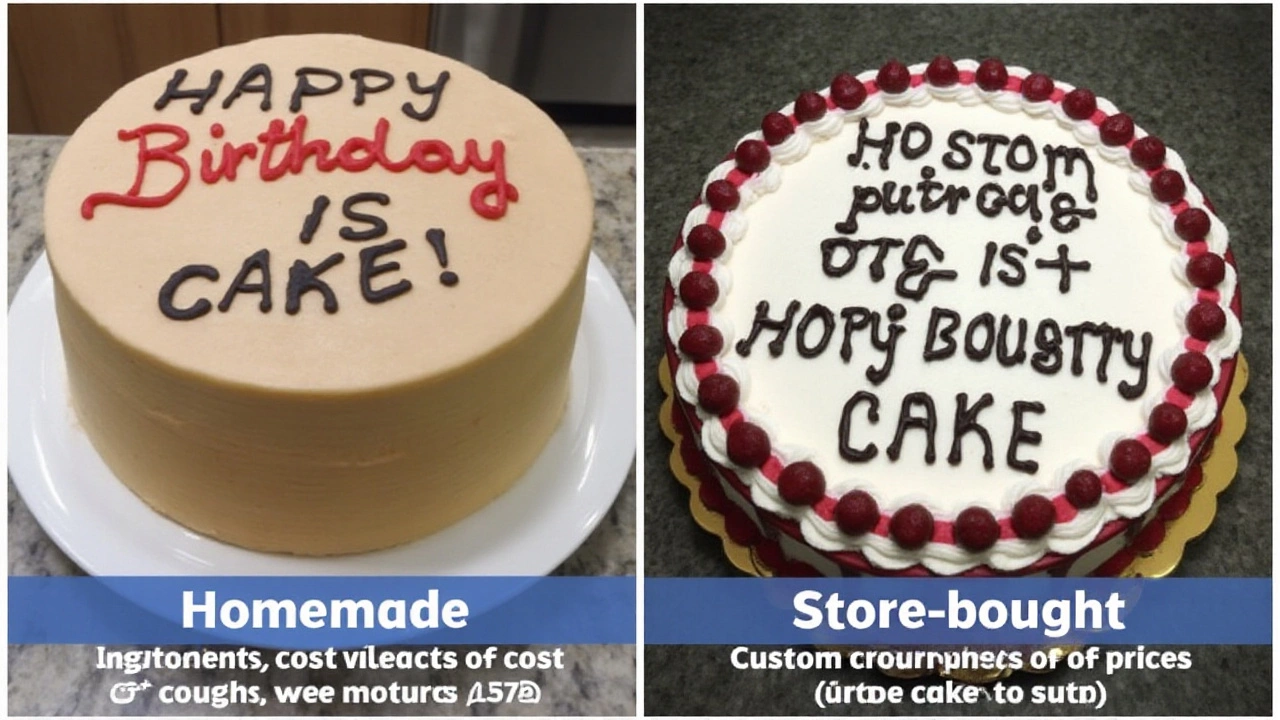
Cost-Saving Tips
When it comes to planning a birthday celebration, saving costs on the cake can have a big impact on your overall budget. Baking a cake at home is often the first thought that pops into our minds when thinking of budget-friendly options. To really maximize savings, start with a detailed list of all the ingredients required. Many ingredients, like flour, sugar, and baking powder, are regular staples in most kitchens, which means you might already have them. Buying in bulk for things you use often, like flour or sugar, can save money in the long run. And don't forget about coupons! Grocery stores often offer discounts on holiday supplies, so keep an eye out for them both online and offline.
If decorating a cake is your concern, turn to online tutorials. The internet is filled with videos and articles to help you learn how to add flair to your cake without buying expensive decorations. Invest in a basic set of piping nozzles and food coloring; these tools go a long way in transforming a cake from plain to gorgeous. If you're short on time, consider seeking help from a family member or friend who enjoys baking. Baking together can be a fun, cost-saving activity that adds a personal touch to the cake.
For those inclined to purchase from a bakery instead, there are still ways to save. Many bakeries offer discounts or loyalty programs, so signing up can provide significant cost benefits. Consider ordering a smaller cake to serve as the centerpiece and supplementing it with homemade cupcakes. Often, buying a simple design and adding personal touches like fresh fruit or chocolate at home can make the cake look custom-made without the hefty price tag.
According to a
A recent survey by the National Retail Bakery Association showed that 47% of customers found pre-ordering early could fetch them a better deal, with some saying they saved as much as 20% on their orders.Which means planning ahead not only ensures you get your desired cake, it also helps you stretch your budget.
Another little-known trick is to ask your local grocery store bakery for freshly baked cakes left over at the end of the day, which are often sold at a reduced price. Requesting them for events can prove inexpensive if you have basic decorating skills or want a minimalist look. The key is to think creatively and adapt to what's available, which opens up a world of cost-saving opportunities whether you're buying or baking.
Balancing Cost with Convenience
For many of us, the decision between buying a cake or making one ourselves often comes down to a delicate balance of cost and convenience. A primary consideration involves the monetary aspect; purchasing a cake might initially seem more expensive than gathering your own ingredients. Many bakeries charge a premium for labor-intensive designs, customization, and the high-quality ingredients they offer. This could lead to a significant price tag, especially for elaborate birthday cakes that feature intricate details or cater to specific dietary needs.
However, the convenience aspect cannot be understated. Ordering a cake from a bakery means you save on time, which can be invaluable, especially when planning a party. Baking at home, meanwhile, requires careful planning of both ingredients and time. You must consider not only the time spent baking but also the preparation involved, such as shopping for ingredients and any practice runs if you're trying a new recipe for the first time. This could add up to hours or even days depending on your comfort level in the kitchen and the cake's complexity.
Some people take pride in the hands-on approach of baking their own cakes, finding joy in the craft and the personal touch it adds to a celebration. This can be a compelling reason to bake, but it is important to be honest with yourself about your baking skills and experience. A poorly executed cake can lead to unnecessary stress and cost overrun. Interestingly, according to a survey conducted by the American Cake Decorating Magazine, 45% of home bakers admit to having a cake fail at least once before achieving the desired result.
On the other hand, buying a store-bought cake allows you to focus on other aspects of your celebration without the hassle of decorating mishaps. It means you can confidently serve your guests knowing that you're offering a professionally made product that is likely both tasty and visually appealing. A significant amount of time saved can go a long way in ensuring a relaxed, enjoyable occasion.
When weighing these options, consider what matters most for your event. If the cake is a focal point of the celebration, it might be worth the investment to buy from a trusted bakery. However, if the journey of creating is more meaningful than the end result, then baking at home could be the more rewarding choice. Indeed, John Stevens, a culinary expert and author, once said,
“The real ingredients of a cake aren’t just flour and sugar, but time, attention, and patience—which, for some, are in more abundant supply than money.”
If unsure, a hybrid approach might work best for your needs. Consider semi-homemade options, such as buying a simple cake base and personalizing it with homemade frosting or decorations. This can offer a cost-effective compromise, allowing you to save on both time and expense while retaining some creative control. Whatever you decide, the goal is to make a choice that aligns with your values, timeline, and budget, ensuring that the birthday celebration is memorable for all the right reasons.

